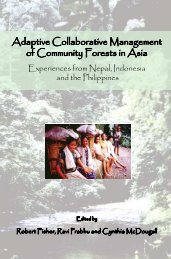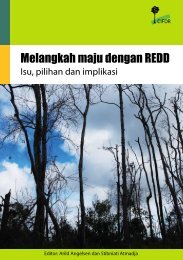Where the power lies: multiple stakeholder politics over natural ...
Where the power lies: multiple stakeholder politics over natural ...
Where the power lies: multiple stakeholder politics over natural ...
Create successful ePaper yourself
Turn your PDF publications into a flip-book with our unique Google optimized e-Paper software.
must get permits if <strong>the</strong>y want to sell <strong>the</strong> products. One local respondent compared <strong>the</strong><br />
management arrangement where all use especially for valuable wet timber is unheard of<br />
and is determined by <strong>the</strong> forestry authority to <strong>the</strong> absolute <strong>power</strong> a husband has <strong>over</strong> his<br />
spouse in this way, “wet trees are <strong>the</strong> wives of <strong>the</strong> forestry Commission, it is not possible<br />
for anyone to ask to harvest that tree, it is similar to asking a man to if one can have<br />
relations with his wife”. Ano<strong>the</strong>r, local respondent explained <strong>the</strong> resentment that locals<br />
feel at being limited to subsistence use of <strong>the</strong> forests when outsiders can come and<br />
harvest valuable timber in this statement: ‘FC wants to look after people who come<br />
from far and neglects people who live here. You would not buy a uniform for ano<strong>the</strong>r’s<br />
child when your own has nothing, You would first clo<strong>the</strong> your child <strong>the</strong>n clo<strong>the</strong> <strong>the</strong><br />
o<strong>the</strong>r.’ Despite <strong>the</strong> project, resentment towards <strong>the</strong> Forestry Commission is undiminished<br />
among <strong>the</strong> general population.<br />
Very few people, especially transporters and local livestock owners, saw any positive<br />
impact of having <strong>the</strong> project. Though no figures are available to verify this claim, both<br />
forestry officials and local people observe that incidences of poaching are higher relative<br />
to <strong>the</strong> pre-project situation. For example, one villager who lived on <strong>the</strong> edge of <strong>the</strong><br />
forest states:<br />
12<br />
‘Sometimes I do not go to get <strong>the</strong> permit, I just go into <strong>the</strong> forest, as you can see I<br />
live on <strong>the</strong> forest boundary. The RMC members live far away and when I do not have<br />
time to visit <strong>the</strong>m, I just go into <strong>the</strong> forest and get what I want. Also some of <strong>the</strong><br />
RMC members are too full of <strong>the</strong>mselves and <strong>the</strong>y take <strong>the</strong>ir time processing <strong>the</strong><br />
permits as if to make you feel <strong>the</strong>ir authority. Once I got caught and <strong>the</strong>y took all <strong>the</strong><br />
grass.’<br />
Once <strong>the</strong> revenue is collected, <strong>the</strong> local community, <strong>the</strong> RMC and <strong>the</strong> Forestry Commission<br />
hold consultations to decide on which projects should be financed. Local people allege<br />
that <strong>the</strong>y only use <strong>the</strong> revenue under <strong>the</strong> direction of <strong>the</strong> Forestry Commission. The<br />
Forestry Commission prefers certain types of projects and forces <strong>the</strong> local people to<br />
select <strong>the</strong>se even when <strong>the</strong>y are low priority. Local villagers complain that even when<br />
<strong>the</strong> Forestry Commission<br />
‘says <strong>the</strong> money is yours, but tells people do this and do that in that way and this<br />
way, where is our ownership in that…<strong>the</strong> money generated by <strong>the</strong> RMC is controlled<br />
by <strong>the</strong> Forestry Commission, <strong>the</strong> money from <strong>the</strong> RMC is not our money, that is why<br />
people poach, <strong>the</strong>y say <strong>the</strong> resources belong to <strong>the</strong> Forestry Commission and <strong>the</strong>y<br />
are not being used.’<br />
Respondents find that <strong>the</strong>ir choices of project are rejected by <strong>the</strong> officials who state<br />
that<br />
‘you have lost focus, what you plan to do has nothing to do with <strong>the</strong> Forestry<br />
Commission, but this rejects people’s desires, beekeeping is not popular, we told <strong>the</strong><br />
authority that we wanted to build a school, but <strong>the</strong>y also said we lost focus. Beekeeping<br />
is not sustainable, we want things that will last, no one survives on a gum tree which<br />
<strong>the</strong>y want us to plant.’<br />
Relations between <strong>the</strong> RMCs and RDCs<br />
The creation of RMCs is highly contested by o<strong>the</strong>r local organizations like Rural district<br />
council which argues that <strong>the</strong> joint management project should have been implemented<br />
by <strong>the</strong> Village development committee, a local g<strong>over</strong>nment administrative structure set

















